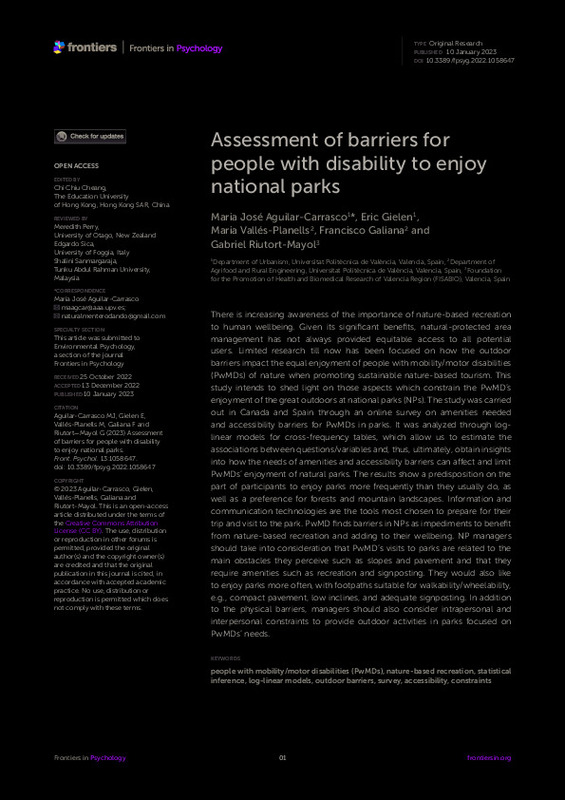JavaScript is disabled for your browser. Some features of this site may not work without it.
Buscar en RiuNet
Listar
Mi cuenta
Estadísticas
Ayuda RiuNet
Admin. UPV
Assessment of barriers for people with disability to enjoy national parks
Mostrar el registro sencillo del ítem
Ficheros en el ítem
| dc.contributor.author | Aguilar-Carrasco, Maria José
|
es_ES |
| dc.contributor.author | Gielen, Eric
|
es_ES |
| dc.contributor.author | Vallés-Planells, María
|
es_ES |
| dc.contributor.author | Galiana, Francisco
|
es_ES |
| dc.contributor.author | Riutort-Mayol, Gabriel
|
es_ES |
| dc.date.accessioned | 2023-10-27T18:01:48Z | |
| dc.date.available | 2023-10-27T18:01:48Z | |
| dc.date.issued | 2023-01-10 | es_ES |
| dc.identifier.uri | http://hdl.handle.net/10251/198952 | |
| dc.description.abstract | [EN] There is increasing awareness of the importance of nature-based recreation to human wellbeing. Given its significant benefits, natural-protected area management has not always provided equitable access to all potential users. Limited research till now has been focused on how the outdoor barriers impact the equal enjoyment of people with mobility/motor disabilities (PwMDs) of nature when promoting sustainable nature-based tourism. This study intends to shed light on those aspects which constrain the PwMD¿s enjoyment of the great outdoors at national parks (NPs). The study was carried out in Canada and Spain through an online survey on amenities needed and accessibility barriers for PwMDs in parks. It was analyzed through log linear models for cross-frequency tables, which allow us to estimate the associations between questions/variables and, thus, ultimately, obtain insights into how the needs of amenities and accessibility barriers can affect and limit PwMDs¿ enjoyment of natural parks. The results show a predisposition on the part of participants to enjoy parks more frequently than they usually do, as well as a preference for forests and mountain landscapes. Information and communication technologies are the tools most chosen to prepare for their trip and visit to the park. PwMD finds barriers in NPs as impediments to benefit from nature-based recreation and adding to their wellbeing. NP managers should take into consideration that PwMD¿s visits to parks are related to the main obstacles they perceive such as slopes and pavement and that they require amenities such as recreation and signposting. They would also like to enjoy parks more often, with footpaths suitable for walkability/wheelability, e.g., compact pavement, low inclines, and adequate signposting. In addition to the physical barriers, managers should also consider intrapersonal and interpersonal constraints to provide outdoor activities in parks focused on PwMDs¿ needs. | es_ES |
| dc.description.sponsorship | This research received partial support and external funding from the Instituto de Salud Carlos III, Spain (grant CD21/00186-Sara Borrell Postdoctoral Fellowship) and was co-funded by the European Union. | es_ES |
| dc.language | Inglés | es_ES |
| dc.publisher | Frontiers Media SA | es_ES |
| dc.relation.ispartof | Frontiers in Psychology | es_ES |
| dc.rights | Reconocimiento (by) | es_ES |
| dc.subject | People with mobility/motor disabilities (PwMDs) | es_ES |
| dc.subject | Nature-based recreation | es_ES |
| dc.subject | Statistical inference | es_ES |
| dc.subject | Log-linear models | es_ES |
| dc.subject | Outdoor barriers | es_ES |
| dc.subject | Survey | es_ES |
| dc.subject | Accessibility | es_ES |
| dc.subject | Constraints | es_ES |
| dc.subject.classification | URBANISTICA Y ORDENACION DEL TERRITORIO | es_ES |
| dc.subject.classification | INGENIERIA AGROFORESTAL | es_ES |
| dc.title | Assessment of barriers for people with disability to enjoy national parks | es_ES |
| dc.type | Artículo | es_ES |
| dc.identifier.doi | 10.3389/fpsyg.2022.1058647 | es_ES |
| dc.relation.projectID | info:eu-repo/grantAgreement/ISCIII//CD21%2F00186/ | es_ES |
| dc.rights.accessRights | Abierto | es_ES |
| dc.contributor.affiliation | Universitat Politècnica de València. Escuela Técnica Superior de Ingeniería Agronómica y del Medio Natural - Escola Tècnica Superior d'Enginyeria Agronòmica i del Medi Natural | es_ES |
| dc.contributor.affiliation | Universitat Politècnica de València. Escuela Técnica Superior de Ingenieros de Caminos, Canales y Puertos - Escola Tècnica Superior d'Enginyers de Camins, Canals i Ports | es_ES |
| dc.description.bibliographicCitation | Aguilar-Carrasco, MJ.; Gielen, E.; Vallés-Planells, M.; Galiana, F.; Riutort-Mayol, G. (2023). Assessment of barriers for people with disability to enjoy national parks. Frontiers in Psychology. 13:1-16. https://doi.org/10.3389/fpsyg.2022.1058647 | es_ES |
| dc.description.accrualMethod | S | es_ES |
| dc.relation.publisherversion | https://doi.org/10.3389/fpsyg.2022.1058647 | es_ES |
| dc.description.upvformatpinicio | 1 | es_ES |
| dc.description.upvformatpfin | 16 | es_ES |
| dc.type.version | info:eu-repo/semantics/publishedVersion | es_ES |
| dc.description.volume | 13 | es_ES |
| dc.identifier.eissn | 1664-1078 | es_ES |
| dc.identifier.pmid | 36704681 | es_ES |
| dc.identifier.pmcid | PMC9872147 | es_ES |
| dc.relation.pasarela | S\480608 | es_ES |
| dc.contributor.funder | European Commission | es_ES |
| dc.contributor.funder | Instituto de Salud Carlos III | es_ES |
| dc.contributor.funder | Universitat Politècnica de València | es_ES |
| dc.subject.ods | 03.- Garantizar una vida saludable y promover el bienestar para todos y todas en todas las edades | es_ES |
| dc.subject.ods | 04.- Garantizar una educación de calidad inclusiva y equitativa, y promover las oportunidades de aprendizaje permanente para todos | es_ES |
| dc.subject.ods | 11.- Conseguir que las ciudades y los asentamientos humanos sean inclusivos, seguros, resilientes y sostenibles | es_ES |
| upv.costeAPC | 3163,37 | es_ES |








